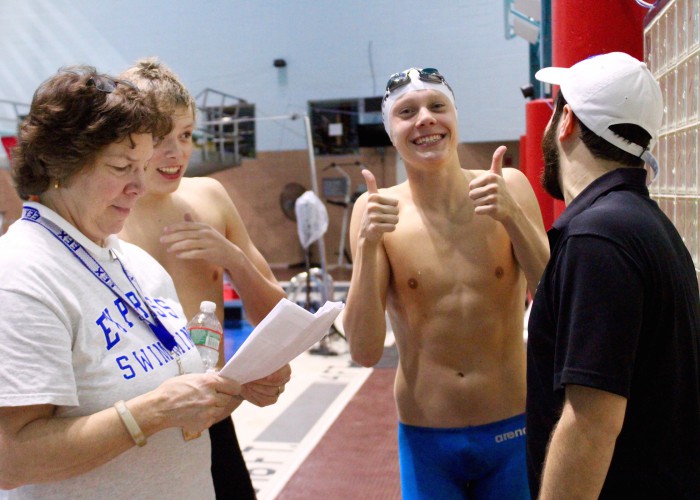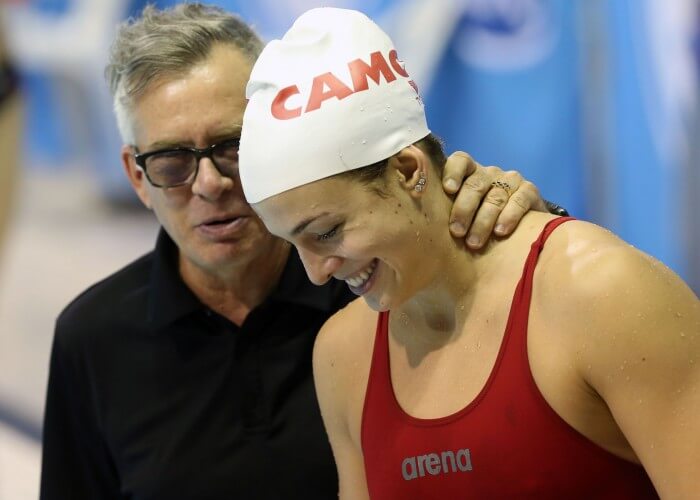How to Respectfully Argue With Your Coach

By Jamie Kolar, Swimming World College Intern.
In swimming, just as in all other aspects life, there are several relationships at play. Arguably, the most pertinent relationship that will propel you to your goals in the swimming world is the swimmer-coach relationship. To put it simply, this can be a complicated relationship that requires some give and take with clear feedback and direction.
All strong relationships require an open line of communication, mutual respect and some compromise at times. Not one is perfect – not even Michael Phelps and Bob Bowman. Phelps has spoken openly about the arguments he and his longtime coach have had, and many haven’t been pretty. Some resulted in them not speaking for a few days. However, they have a closer bond and trust formed now because neither one has held anything back from the other in the past.
It can be hard go about situations in which you disagree with your coach or vice versa, and it’s even more challenging to resolve the problem when you have so much of your energy and resources invested in the sport. However difficult the conflict, here are three things to keep in mind in order to come to a productive resolution.
1. Express your feelings tactfully.

Photo Courtesy: Taylor Brien
You are not going to agree with everything your coach says. When you find this situation arising, make sure to express your feelings and concerns in a clear manner. Be totally honest with how you are feeling and what you are thinking so that all the cards are on the table. It is important for your coach to understand your full line of thinking and the root of the issue with the understanding that you’re on the same team and want what’s best. Then, the both of you can have a thoughtful discussion together rather than a power struggle against each other.
When you are expressing your feelings, it is also important to remain calm. In a heated discussion, it is easy to let your emotions run high. This is not the most effective way of letting your voice be heard and understood, and it usually doesn’t end in a positive resolution. The best way of coming to any kind of agreement is to be clear and calm when discussing any issue.
2. Take a deep breath and maintain a tone of respect.

Photo Courtesy: Scott Grant/Swimming Canada
In the heat of the moment, it is easy to say something that you do not mean and is spiteful to the other person. If you are arguing with your coach, it is important to remember to do so respectfully. You have been through a lot together and it would be a shame to damage this relationship that took so long to build with a few careless words.
The best way to go about conflict resolution is to first take a deep breath if you feel yourself getting upset. Then, think about what you are about to say before you say it. You can get your point across to your coach and be respectful at the same time. When the argument is over, your coach will respect you even more for how you handled the situation with such grace and composure as opposed to empty jabs and anger.
3. Don’t just agree with your coach to end the argument.

Photo Courtesy: Peter H. Bick
If you have been arguing for a long time, it is easy to say “You’re right,” and walk away. However, this will leave you with unresolved issues that your coach will not understand, which might result in a bigger problem later on.
Instead, it could be beneficial to take a step back and pick up the discussion later. That way the both of you have time to cool off, clear your heads and gather your thoughts. This will probably lead to a more efficient discussion the next day and will prevent any misunderstandings in the heat of the moment. You will feel that you have been heard and understood without building frustration that may surface later.
The relationship between a swimmer and a coach is possibly the most powerful tool to yield a successful season and one swimmers hold dear to their hearts. There will be disagreements in any good relationship, but it is important to know that one argument does not detract from your overall relationship. In a way, it shows a level of trust and comfort with one another. Keeping an open line of communication will help you understand your training and have a clearer focus on where you are going – together.
Commentary: All commentaries are the opinion of the author and do not necessarily reflect the views of Swimming World Magazine nor its staff.




Samantha Bischoff
Joe Stott